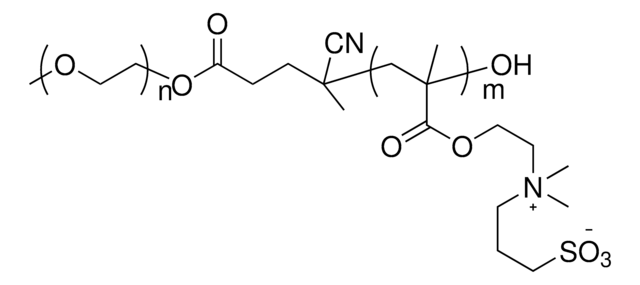N0665
NDSB 211
≥98% (TLC)
Synonym(s):
3-[Dimethyl-(2-hydroxyethyl)ammonio]-1-propanesulfonate, Dimethyl(2-hydroxyethyl)(3-sulfopropyl)ammonium hydroxide inner salt, Dimethyl-2-hydroxyethylammoniumpropane sulfonate
About This Item
Recommended Products
description
zwitterionic
Quality Level
Assay
≥98% (TLC)
form
solid
mol wt
211.28 g/mol
technique(s)
DNA extraction: suitable
color
white
solubility
methanol: 5 mg/mL, clear, colorless
SMILES string
OCC[N+](C)(C)CCCS([O-])(=O)=O
InChI
1S/C7H17NO4S/c1-8(2,5-6-9)4-3-7-13(10,11)12/h9H,3-7H2,1-2H3
InChI key
CNXPCGBLGHKAIL-UHFFFAOYSA-N
General description
Application
Other Notes
Signal Word
Danger
Hazard Statements
Precautionary Statements
Hazard Classifications
Skin Corr. 1B
Storage Class Code
8A - Combustible corrosive hazardous materials
WGK
WGK 3
Flash Point(F)
Not applicable
Flash Point(C)
Not applicable
Choose from one of the most recent versions:
Certificates of Analysis (COA)
Don't see the Right Version?
If you require a particular version, you can look up a specific certificate by the Lot or Batch number.
Already Own This Product?
Find documentation for the products that you have recently purchased in the Document Library.
Customers Also Viewed
Our team of scientists has experience in all areas of research including Life Science, Material Science, Chemical Synthesis, Chromatography, Analytical and many others.
Contact Technical Service![[2-(Methacryloyloxy)ethyl]dimethyl-(3-sulfopropyl)ammonium hydroxide 95%](/deepweb/assets/sigmaaldrich/product/structures/217/219/73c91e1c-0ee4-4b3d-bead-a6dc3d09d1da/640/73c91e1c-0ee4-4b3d-bead-a6dc3d09d1da.png)











